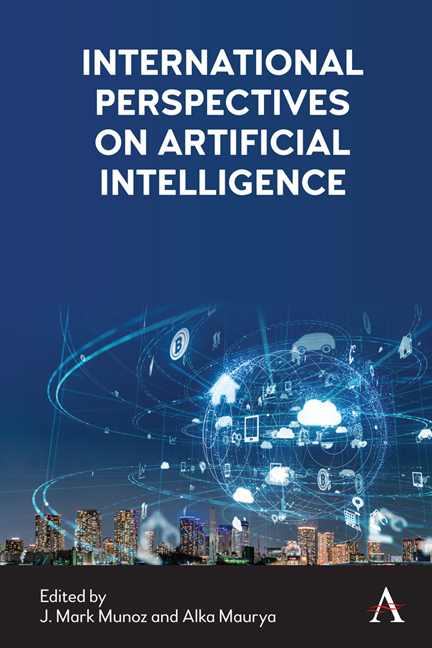Book contents
- Frontmatter
- Contents
- List of Illustrations
- List of Contributors
- Chapter 1 Introduction
- Chapter 2 Artificial Intelligence in the United States
- Chapter 3 Artificial Intelligence in Canada
- Chapter 4 The Mad Max Interceptor Experience in the UK: Artificial Intelligence in Mortgages
- Chapter 5 Artificial Intelligence in Germany: Strategy and Policy—the Impact of AI on German Economy
- Chapter 6 Japan's ‘Artificial-Intelligence Hospital’ Project: Can It Help the Ageing Population?
- Chapter 7 Artificial Intelligence in the Middle East European Countries
- Chapter 8 A Million Products for a Billion People: Artificial Intelligence in Consumer Industries in India
- Chapter 9 “All-In AI”: What is Compelling Companies in China to Bet the House on Artificial Intelligence?
- Chapter 10 Artificial Intelligence Research in Russia: Recovering from the Polar Winter
- Chapter 11 The Fourth Industrial Revolution in Africa
- Chapter 12 The Adoption of Artificial Intelligence within the Caribbean: Resuscitating the CARICOM's Single Market and Economy
- Chapter 13 Has Australia Been Late in Addressing the Artificial Intelligence Challenges?
- Chapter 14 Conclusion
- Index
Chapter 12 - The Adoption of Artificial Intelligence within the Caribbean: Resuscitating the CARICOM's Single Market and Economy
Published online by Cambridge University Press: 02 March 2022
- Frontmatter
- Contents
- List of Illustrations
- List of Contributors
- Chapter 1 Introduction
- Chapter 2 Artificial Intelligence in the United States
- Chapter 3 Artificial Intelligence in Canada
- Chapter 4 The Mad Max Interceptor Experience in the UK: Artificial Intelligence in Mortgages
- Chapter 5 Artificial Intelligence in Germany: Strategy and Policy—the Impact of AI on German Economy
- Chapter 6 Japan's ‘Artificial-Intelligence Hospital’ Project: Can It Help the Ageing Population?
- Chapter 7 Artificial Intelligence in the Middle East European Countries
- Chapter 8 A Million Products for a Billion People: Artificial Intelligence in Consumer Industries in India
- Chapter 9 “All-In AI”: What is Compelling Companies in China to Bet the House on Artificial Intelligence?
- Chapter 10 Artificial Intelligence Research in Russia: Recovering from the Polar Winter
- Chapter 11 The Fourth Industrial Revolution in Africa
- Chapter 12 The Adoption of Artificial Intelligence within the Caribbean: Resuscitating the CARICOM's Single Market and Economy
- Chapter 13 Has Australia Been Late in Addressing the Artificial Intelligence Challenges?
- Chapter 14 Conclusion
- Index
Summary
Introduction
Since time immemorial, the small island states of the Caribbean have continuously developed regional integration schemes to achieve greater independence and development among themselves. This has resulted in several multipronged approaches to integration covering a wide scope. The Caribbean Community and Common Market (CARICOM) was established by the Treaty of Chaguaramas, which was signed by Barbados, Guyana, Jamaica and Trinidad and Tobago and came into effect on 1 August 1973, after which 11 other territories joined.
CARICOM is a unique arrangement. According to Payne (1994), writing in the second decade of its existence, CARICOM's survival was secured on the basis that it would steer clear of Caribbean political integration and all its facets, namely supranationalism, which threatens national independence and sovereignty. With respect to its governance mechanisms, Payne's discussion describes the CARICOM system as being managed by a chain of organs comprised of member states’ politicians and is merely ‘serviced by its secretariat’. Decision-making within the Community has to be by unanimous agreement but the implementation of all decisions is up to the individual member state and ‘its own constitutional procedures’ (1994).
In following the trends of regional integration worldwide, the European Union has launched its AI strategy and roadmap. However, in the conceptualization of AI within the Caribbean, the author affirms the belief that as developed countries increase their adoption of AI, the gap between the developing and developed countries will widen (Szcepanski 2019).
This research aims to examine the utilization of artificial intelligence (AI) within the Caribbean. This topic was selected with the aim of identifying key trends in AI within CARICOM. An assessment of key private sectors, regional organizations and civil society representatives across four CARICOM territories as well as national policymakers involved in the information and communication technology (ICT) arena was done to identify related opportunities in AI within CARICOM and the subsequent prospects for increasing economic growth, ethical governance and cross-border flows.
Introduction of the CARICOM Single Market and Economy (CSME)
As with previous integration attempts, upon realizing the limitations of the regional initiative, Caribbean heads of governments agreed to deepen their state of regional integration and thus conceptualized a Caribbean Single Market and Economy.
- Type
- Chapter
- Information
- International Perspectives on Artificial Intelligence , pp. 107 - 116Publisher: Anthem PressPrint publication year: 2022

